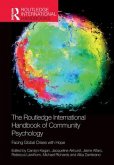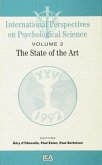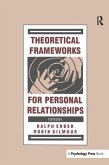Routledge International Handbook of Theoretical and Philosophical Psychology
Critiques, Problems, and Alternatives to Psychological Ideas
Herausgeber: Slife, Brent D; Richardson, Frank C; Yanchar, Stephen C
Routledge International Handbook of Theoretical and Philosophical Psychology
Critiques, Problems, and Alternatives to Psychological Ideas
Herausgeber: Slife, Brent D; Richardson, Frank C; Yanchar, Stephen C
- Broschiertes Buch
- Merkliste
- Auf die Merkliste
- Bewerten Bewerten
- Teilen
- Produkt teilen
- Produkterinnerung
- Produkterinnerung
Routledge International Handbook of Theoretical and Philosophical Psychology is a compilation of works by leading scholars in theoretical and philosophical psychology that offers critical analyses of, and alternatives to, current theories and philosophies typically taken for granted in mainstream psychology.
Andere Kunden interessierten sich auch für
![The Routledge International Handbook of Community Psychology The Routledge International Handbook of Community Psychology]() The Routledge International Handbook of Community Psychology68,99 €
The Routledge International Handbook of Community Psychology68,99 €![Hermeneutic Dialogue and Shaping the Landscape of Theoretical and Philosophical Psychology Hermeneutic Dialogue and Shaping the Landscape of Theoretical and Philosophical Psychology]() Hermeneutic Dialogue and Shaping the Landscape of Theoretical and Philosophical Psychology77,99 €
Hermeneutic Dialogue and Shaping the Landscape of Theoretical and Philosophical Psychology77,99 €![International Perspectives on Psychological Science, II: The State of the Art International Perspectives on Psychological Science, II: The State of the Art]() Paul BertelsonInternational Perspectives on Psychological Science, II: The State of the Art71,99 €
Paul BertelsonInternational Perspectives on Psychological Science, II: The State of the Art71,99 €![Routledge Handbook of Identity Studies Routledge Handbook of Identity Studies]() Routledge Handbook of Identity Studies68,99 €
Routledge Handbook of Identity Studies68,99 €![Theoretical Frameworks for Personal Relationships Theoretical Frameworks for Personal Relationships]() Theoretical Frameworks for Personal Relationships74,99 €
Theoretical Frameworks for Personal Relationships74,99 €![American Mnemotechny: Or Art of Memory, Theoretical and Practical ... Comprising the Principles of the Art, As Applied to Ancient History .. American Mnemotechny: Or Art of Memory, Theoretical and Practical ... Comprising the Principles of the Art, As Applied to Ancient History ..]() AnonymousAmerican Mnemotechny: Or Art of Memory, Theoretical and Practical ... Comprising the Principles of the Art, As Applied to Ancient History ..28,99 €
AnonymousAmerican Mnemotechny: Or Art of Memory, Theoretical and Practical ... Comprising the Principles of the Art, As Applied to Ancient History ..28,99 €![Basic Mental Concepts - Their Clinical and Theoretical Value Basic Mental Concepts - Their Clinical and Theoretical Value]() Edward GloverBasic Mental Concepts - Their Clinical and Theoretical Value14,99 €
Edward GloverBasic Mental Concepts - Their Clinical and Theoretical Value14,99 €-
-
-
Routledge International Handbook of Theoretical and Philosophical Psychology is a compilation of works by leading scholars in theoretical and philosophical psychology that offers critical analyses of, and alternatives to, current theories and philosophies typically taken for granted in mainstream psychology.
Hinweis: Dieser Artikel kann nur an eine deutsche Lieferadresse ausgeliefert werden.
Hinweis: Dieser Artikel kann nur an eine deutsche Lieferadresse ausgeliefert werden.
Produktdetails
- Produktdetails
- Verlag: Taylor & Francis
- Seitenzahl: 620
- Erscheinungstermin: 4. Oktober 2024
- Englisch
- Abmessung: 242mm x 171mm x 34mm
- Gewicht: 1016g
- ISBN-13: 9780367477820
- ISBN-10: 0367477823
- Artikelnr.: 71583510
- Herstellerkennzeichnung
- Libri GmbH
- Europaallee 1
- 36244 Bad Hersfeld
- gpsr@libri.de
- Verlag: Taylor & Francis
- Seitenzahl: 620
- Erscheinungstermin: 4. Oktober 2024
- Englisch
- Abmessung: 242mm x 171mm x 34mm
- Gewicht: 1016g
- ISBN-13: 9780367477820
- ISBN-10: 0367477823
- Artikelnr.: 71583510
- Herstellerkennzeichnung
- Libri GmbH
- Europaallee 1
- 36244 Bad Hersfeld
- gpsr@libri.de
Brent D. Slife recently retired as Professor of Psychology at Brigham Young University. He has been honored with BYU's highest faculty award as well as the American Psychological Association Presidential Citation for his contribution to psychology. Dr. Slife has served as the President of the Society of Theoretical and Philosophical Psychology and was until recently the Editor-in-Chief of the APA Journal of Theoretical and Philosophical Psychology. He also edits a book series with Routledge Publications and has authored or co-authored over 200 articles and 10 books. Stephen C. Yanchar is Professor of Instructional Psychology and Technology at Brigham Young University. He is an associate editor of the Journal of Theoretical and Philosophical Psychology and an editorial board member of New Ideas in Psychology. He is co-editor of the Routledge volume Hermeneutic Moral Realism in Psychology: Theory and Practice. Frank C. Richardson is Professor of Educational Psychology (emeritus) at the University of Texas, Austin. He is author or editor of several books, including Re-envisioning Psychology and Critical Thinking about Psychology and the author of over 100 articles and chapters in theoretical psychology and the philosophy of social science.
Section I. Alternative Conceptions of Psychology as a Discipline 1. Minds,
Brains, or Persons? What is Psychology About? 2. Psychology's Flawed Focus
on Individuals and Individualism: A Strong Relationality Alternative 3. The
End of Disembodied Mind: Fleshing Out Psychology 4. The Distorting Lens of
Psychology's Individualism and a Social Realist Alternative 5. Should
Psychology Care About Metaphysics? 6. Philosophical Hermeneutics: Beyond
Objectivism and Relativism in Psychology 7. Carving the Joints: The
Ontology and Epistemology of Natural Kinds in Psychology; Section II.
Alternative Conceptions of Fields Within Psychology: Positive Psychology,
Development, Learning, Evolutionary Psychology, History, and Ethics 8. A
Social Constructionist Critique of Positive Psychology 9. Striving for the
Whole Toward an Organismic Theory of Development 10. Beyond Mechanism in
Psychological Theories of Learning: A Hermeneutic Account of Embodied
Familiarization 11. Reductive Naturalism and Evolutionary Psychology's
Empty Ethics of Enhancement: A Phenomenological Alternative 12. Psychology
and the Significance of History 13. Philosophical and Political Lessons
from the Hoffman Report: Toward a Hermeneutic Re-Moralization of
Psychology; Section III. Alternative Conceptions of Self and Identity; 14.
Who am I? Towards a Multi-Voiced Dialogical Self 15. Racial Identity and
Transnational Migration: Black-Canadian and Indian-American Diaspora 16. A
Critical Interpretative Psychology of Gender 17. Narrative Psychology and
Beyond: Returning the Other to the Story of the Self 18. Subjectivity 19.
Preserving Agency as a Human Phenomenon; Section IV. Alternative
Conceptions of Psychological Inquiry 20. A Nonreductive "Person-based
Ontology" for Psychological Inquiry 21. Why Human Inquiry Is Different than
Natural Science Inquiry 22. The Participatory Perspective: Moving Beyond
"Pro-World" Approaches to Theorizing in Psychology Without Adopting
"Pro-Subject/Mind" Approaches 23. Metaphors, Idioms, and Clichés: The
Rhetoric of Objectivity in Psychological Science Discourse 24. Existential
Phenomenological Research: A "Human Science" Alternative for Psychology;
Section V. Alternative Conceptions of Psychological Practices:
Psychotherapy, Abnormality, Theorizing, Aging, and Marriage 25. The Virtue
of Virtue for Psychotherapy: Contextualizing and Situating the Conversation
26. Subjectivity, Schizophrenia, and the Self: An Introduction to
Phenomenological Psychopathology 27. The Praxis of Theorizing in
Psychology: From Traditional to Critical Perspectives 28. Radicalizing
Aging Theory in a Participatory Democracy: Critical Reflective Praxis of
Phenomenology as Enacted Activism 29. Rethinking Marriage in a
Post-Traditional Western World
Brains, or Persons? What is Psychology About? 2. Psychology's Flawed Focus
on Individuals and Individualism: A Strong Relationality Alternative 3. The
End of Disembodied Mind: Fleshing Out Psychology 4. The Distorting Lens of
Psychology's Individualism and a Social Realist Alternative 5. Should
Psychology Care About Metaphysics? 6. Philosophical Hermeneutics: Beyond
Objectivism and Relativism in Psychology 7. Carving the Joints: The
Ontology and Epistemology of Natural Kinds in Psychology; Section II.
Alternative Conceptions of Fields Within Psychology: Positive Psychology,
Development, Learning, Evolutionary Psychology, History, and Ethics 8. A
Social Constructionist Critique of Positive Psychology 9. Striving for the
Whole Toward an Organismic Theory of Development 10. Beyond Mechanism in
Psychological Theories of Learning: A Hermeneutic Account of Embodied
Familiarization 11. Reductive Naturalism and Evolutionary Psychology's
Empty Ethics of Enhancement: A Phenomenological Alternative 12. Psychology
and the Significance of History 13. Philosophical and Political Lessons
from the Hoffman Report: Toward a Hermeneutic Re-Moralization of
Psychology; Section III. Alternative Conceptions of Self and Identity; 14.
Who am I? Towards a Multi-Voiced Dialogical Self 15. Racial Identity and
Transnational Migration: Black-Canadian and Indian-American Diaspora 16. A
Critical Interpretative Psychology of Gender 17. Narrative Psychology and
Beyond: Returning the Other to the Story of the Self 18. Subjectivity 19.
Preserving Agency as a Human Phenomenon; Section IV. Alternative
Conceptions of Psychological Inquiry 20. A Nonreductive "Person-based
Ontology" for Psychological Inquiry 21. Why Human Inquiry Is Different than
Natural Science Inquiry 22. The Participatory Perspective: Moving Beyond
"Pro-World" Approaches to Theorizing in Psychology Without Adopting
"Pro-Subject/Mind" Approaches 23. Metaphors, Idioms, and Clichés: The
Rhetoric of Objectivity in Psychological Science Discourse 24. Existential
Phenomenological Research: A "Human Science" Alternative for Psychology;
Section V. Alternative Conceptions of Psychological Practices:
Psychotherapy, Abnormality, Theorizing, Aging, and Marriage 25. The Virtue
of Virtue for Psychotherapy: Contextualizing and Situating the Conversation
26. Subjectivity, Schizophrenia, and the Self: An Introduction to
Phenomenological Psychopathology 27. The Praxis of Theorizing in
Psychology: From Traditional to Critical Perspectives 28. Radicalizing
Aging Theory in a Participatory Democracy: Critical Reflective Praxis of
Phenomenology as Enacted Activism 29. Rethinking Marriage in a
Post-Traditional Western World
Section I. Alternative Conceptions of Psychology as a Discipline 1. Minds,
Brains, or Persons? What is Psychology About? 2. Psychology's Flawed Focus
on Individuals and Individualism: A Strong Relationality Alternative 3. The
End of Disembodied Mind: Fleshing Out Psychology 4. The Distorting Lens of
Psychology's Individualism and a Social Realist Alternative 5. Should
Psychology Care About Metaphysics? 6. Philosophical Hermeneutics: Beyond
Objectivism and Relativism in Psychology 7. Carving the Joints: The
Ontology and Epistemology of Natural Kinds in Psychology; Section II.
Alternative Conceptions of Fields Within Psychology: Positive Psychology,
Development, Learning, Evolutionary Psychology, History, and Ethics 8. A
Social Constructionist Critique of Positive Psychology 9. Striving for the
Whole Toward an Organismic Theory of Development 10. Beyond Mechanism in
Psychological Theories of Learning: A Hermeneutic Account of Embodied
Familiarization 11. Reductive Naturalism and Evolutionary Psychology's
Empty Ethics of Enhancement: A Phenomenological Alternative 12. Psychology
and the Significance of History 13. Philosophical and Political Lessons
from the Hoffman Report: Toward a Hermeneutic Re-Moralization of
Psychology; Section III. Alternative Conceptions of Self and Identity; 14.
Who am I? Towards a Multi-Voiced Dialogical Self 15. Racial Identity and
Transnational Migration: Black-Canadian and Indian-American Diaspora 16. A
Critical Interpretative Psychology of Gender 17. Narrative Psychology and
Beyond: Returning the Other to the Story of the Self 18. Subjectivity 19.
Preserving Agency as a Human Phenomenon; Section IV. Alternative
Conceptions of Psychological Inquiry 20. A Nonreductive "Person-based
Ontology" for Psychological Inquiry 21. Why Human Inquiry Is Different than
Natural Science Inquiry 22. The Participatory Perspective: Moving Beyond
"Pro-World" Approaches to Theorizing in Psychology Without Adopting
"Pro-Subject/Mind" Approaches 23. Metaphors, Idioms, and Clichés: The
Rhetoric of Objectivity in Psychological Science Discourse 24. Existential
Phenomenological Research: A "Human Science" Alternative for Psychology;
Section V. Alternative Conceptions of Psychological Practices:
Psychotherapy, Abnormality, Theorizing, Aging, and Marriage 25. The Virtue
of Virtue for Psychotherapy: Contextualizing and Situating the Conversation
26. Subjectivity, Schizophrenia, and the Self: An Introduction to
Phenomenological Psychopathology 27. The Praxis of Theorizing in
Psychology: From Traditional to Critical Perspectives 28. Radicalizing
Aging Theory in a Participatory Democracy: Critical Reflective Praxis of
Phenomenology as Enacted Activism 29. Rethinking Marriage in a
Post-Traditional Western World
Brains, or Persons? What is Psychology About? 2. Psychology's Flawed Focus
on Individuals and Individualism: A Strong Relationality Alternative 3. The
End of Disembodied Mind: Fleshing Out Psychology 4. The Distorting Lens of
Psychology's Individualism and a Social Realist Alternative 5. Should
Psychology Care About Metaphysics? 6. Philosophical Hermeneutics: Beyond
Objectivism and Relativism in Psychology 7. Carving the Joints: The
Ontology and Epistemology of Natural Kinds in Psychology; Section II.
Alternative Conceptions of Fields Within Psychology: Positive Psychology,
Development, Learning, Evolutionary Psychology, History, and Ethics 8. A
Social Constructionist Critique of Positive Psychology 9. Striving for the
Whole Toward an Organismic Theory of Development 10. Beyond Mechanism in
Psychological Theories of Learning: A Hermeneutic Account of Embodied
Familiarization 11. Reductive Naturalism and Evolutionary Psychology's
Empty Ethics of Enhancement: A Phenomenological Alternative 12. Psychology
and the Significance of History 13. Philosophical and Political Lessons
from the Hoffman Report: Toward a Hermeneutic Re-Moralization of
Psychology; Section III. Alternative Conceptions of Self and Identity; 14.
Who am I? Towards a Multi-Voiced Dialogical Self 15. Racial Identity and
Transnational Migration: Black-Canadian and Indian-American Diaspora 16. A
Critical Interpretative Psychology of Gender 17. Narrative Psychology and
Beyond: Returning the Other to the Story of the Self 18. Subjectivity 19.
Preserving Agency as a Human Phenomenon; Section IV. Alternative
Conceptions of Psychological Inquiry 20. A Nonreductive "Person-based
Ontology" for Psychological Inquiry 21. Why Human Inquiry Is Different than
Natural Science Inquiry 22. The Participatory Perspective: Moving Beyond
"Pro-World" Approaches to Theorizing in Psychology Without Adopting
"Pro-Subject/Mind" Approaches 23. Metaphors, Idioms, and Clichés: The
Rhetoric of Objectivity in Psychological Science Discourse 24. Existential
Phenomenological Research: A "Human Science" Alternative for Psychology;
Section V. Alternative Conceptions of Psychological Practices:
Psychotherapy, Abnormality, Theorizing, Aging, and Marriage 25. The Virtue
of Virtue for Psychotherapy: Contextualizing and Situating the Conversation
26. Subjectivity, Schizophrenia, and the Self: An Introduction to
Phenomenological Psychopathology 27. The Praxis of Theorizing in
Psychology: From Traditional to Critical Perspectives 28. Radicalizing
Aging Theory in a Participatory Democracy: Critical Reflective Praxis of
Phenomenology as Enacted Activism 29. Rethinking Marriage in a
Post-Traditional Western World








